
Friday, August 31, 2007
Tuesday, August 28, 2007
Monday, August 27, 2007
Rough Boys
His guitar chimed from windmills. His reverberations ended in destruction. He wrote head bangers for the drunk drummer and opera for the pretty boy singer, all the while reserving the sensitive bits for himself.
When I was in high school, he was asked if perhaps his lyrics were too literate for rock and roll. “If my lyrics make you look up words like ‘recriminations’ and ‘fester,’” I recall him saying, “then all’s well.”
He had me at “Magic Bus.”
Pete Townshend’s first solo album, “Who Came First,” was acoustic and primarily directed to spirituality, reflecting the teachings of guru-to-rockers Meher Baba. When I was in high school, that eight track guided me home under many starry nights as I learned to drive drunk.
Then came “Empty Glass,” when I was eighteen. The album’s title referred to Townshend’s new sobriety and being clean. Much was made of its technical ingenuity. In “Rough Boys,” for example, Townshend plays bass, melody and chords at the same time. Ponder that as you watch his fingers fly at the end of the song.
Music aside, I was utterly stumped by “Rough Boys.” It seemed that in becoming clean, he was coming clean.
I asked my friend Peabo what he made of it. He suggested that Pete was making fun of punks and gays for being so concerned with uniformity. Pete was singing in the voice of a dirty old man (Townhsend was thirty-eight at the time) who couldn’t tell punks from queers and didn’t care.
That made sense to me. Still, I noticed that these eighties queer/punks looked a lot like the sixties Mods and Rockers of Townshend’s youth, as poignantly eulogized in “Quadrophenia.”
If nothing else, Townshend—at the center of seventies rock—crafted art from a sustained eye for male cultures.
Secretly, the song got me hot. Come over here. I want to bite and kiss you. Not a word is spoken. Make noise. I want to buy you leather.
Gonna get inside you.
There was speculation that with this song, Townshend was coming out as bisexual or gay. He let such speculation ride without much comment. A decade and change later, in an interview, he copped to a couple of experiences with men in the sixties. There you have it, some fans said. Townshend is a fag. No way, others argued. He’s always been with women. He's got kids. He’s straight.
I was impressed that he generally remained above the fray. His sexuality was his own, and as others spilled tabloid ink in trying to discern his preferences, he maintained a decorously private public life.
That got me hot.
Sunday, August 26, 2007
Soccer Practice
Cody sent me a song, telling me to listen to it immediately. “Reynolds sings it,” she said, referring to her teenage-heart throb cousin. “It’s the gayest song ever.”
I promised I would listen, and never did.
A couple of months later, Wendy was playing videos on my computer. “Do you know the Gay Pimp?” she asked. I didn’t, so she clued me in to Jonny McGovern.
I later shared it with Cody. “You idiot,” she said. “That’s the song I wanted you to hear!”
It takes the efforts of several women to make me as gay as I am.
Saturday, August 25, 2007
The Man Who Sold The World
There were few models for bisexuality when I was a kid. Or, more accurately, there were essentially none. “Bisexual” was a weird word for “gay,” which was itself a word for “weird.”
Then along came a curious moment in pop music—a vogue for bisexuality that presaged the later “lesbian chic” of the nineties. It came about as glam, punk and art music began to vie with the popularity of mainstream pop, particularly in Great Britain in the mid-seventies.
The idea of claiming bisexuality seems to have come about as Marc Bolan and David Bowie tussled for attention. Each let it leak that sure, they were bi, what of it? It caught headlines, so Rod Stewart, Elton John and Mick Jagger, among others, played along, dropping hints they would neither confirm nor deny. Later, as social conservatism held sway, most would back away from any previous claim to sex with men. Even Sir Elton took a bride.
I was too young to take much note of the vogue. At any rate, our town’s pop radio stations kept the needle stuck on Southern rock and heavy metal, so I scarcely knew of Bowie or Bolan.
I began to stay up later on weekends, watching television when my parents went to sleep. In those days before cable television, I was exposed to the low-budget theatrics of amateur wrestling, Hammer horror films and David Bowie. I saw Ziggy Stardust on the Midnight Special and stared wide-eyed and afraid.
A few years later, at age sixteen, I caught Bowie performing three songs on Saturday Night Live. He was immobile during “The Man Who Sold The World,” encased in a costume that might have been designed by
Sonia Delaunay. By contrast to his bizarre background singers, Klaus Nomi and Joey Arias, Bowie looked practically human.
He came back for “TVC 1 5” in the uniform of a Chinese stewardess. For “Boys Keep Swinging,” he was transformed into a marionette. In the video for “Boys Keep Swinging,” which I saw on Midnight Special, he reserved a shocking revelation for the denouement.
I didn’t have any idea about what to do with Bowie. I filed his persona under “weird art” and tried to learn the words to his songs as fast as I could. I wasn’t going to hear them anywhere else.
A few years later, “The Man Who Sold the World” would switch on a light bulb in my jumbled sexuality.
Subscribe to:
Comments (Atom)


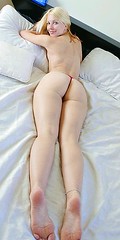



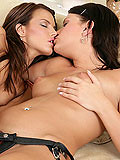

 Shemale Yum
Shemale Yum Grooby Archives
Grooby Archives


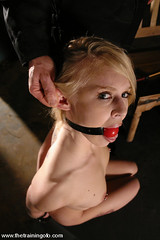
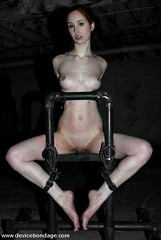
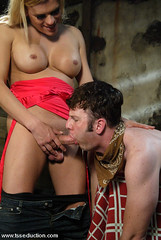
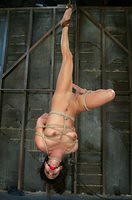

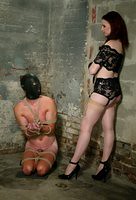
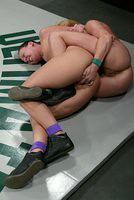
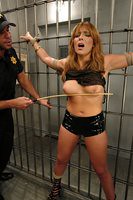
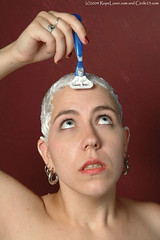 Rope Lover
Rope Lover




